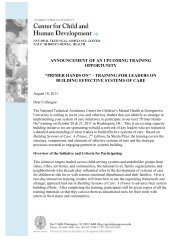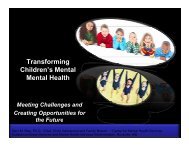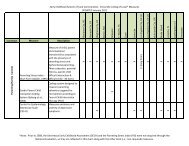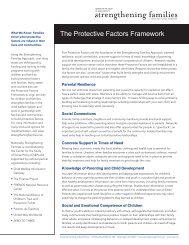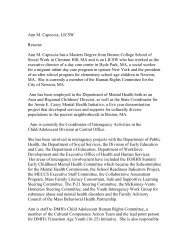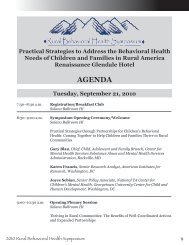Training Institutes 2012 - National Technical Assistance Center for ...
Training Institutes 2012 - National Technical Assistance Center for ...
Training Institutes 2012 - National Technical Assistance Center for ...
Create successful ePaper yourself
Turn your PDF publications into a flip-book with our unique Google optimized e-Paper software.
INSTITUTE #21 8:30 AM FRIDAY • 1:30 PM SATURDAY • SUN 4-5-6<br />
Child FIRST: Early Childhood Mental Health Home Visiting Within a System of Care<br />
INSTITUTES<br />
OBJECTIVES—Participants will learn:<br />
1. To describe the impact of adversity or “toxic stress” in early brain development<br />
2. To identify strategies to prevent damage to the young, developing brain by combining system of care and<br />
psychotherapeutic parent-child approaches<br />
3. To identify the key components of the evidence-based home visiting model, Child FIRST<br />
4. To explain the importance of assessment and <strong>for</strong>mulation in building a family-driven, collaborative plan of care<br />
5. How to use a reflective, relationship-based, therapeutic approach in intervention with children with challenging<br />
behaviors and their families<br />
The Institute will focus on the evidence-based home visiting model, Child FIRST, which protects the developing brain<br />
from the impact of adversity—and the resulting emotional and cognitive impairment—using a synergistic combination<br />
of parent-child psychotherapeutic intervention and a system of care approach. Faculty will highlight the research on<br />
adversity, its impact on the developing brain, and how this in<strong>for</strong>ms the two-pronged approach of Child FIRST—<br />
wraparound and parent-child intervention. The components of the Child FIRST model will be outlined, including<br />
engagement, assessment, development of the child and family plan of care, parent-child dyadic treatment and parent<br />
guidance, care coordination and wraparound services, and mental health consultation in early care and education.<br />
The Child FIRST model has conducted a randomized controlled trial, which has documented strong positive outcomes<br />
with young children and families, including decreased child emotional/behavioral and language problems, decreased<br />
parental depression and other mental health problems, decreased involvement with child protective services, and<br />
increased connection to community-based services and supports.<br />
Specific topics to be covered include:<br />
• How the impact of adversity directly affects the developing brain, highlighting the interaction between genes<br />
and environment<br />
• How the developing brain can be protected through a two-pronged approach: 1) decreasing environmental or “toxic<br />
stress” through comprehensive wraparound services and supports, and 2) buffering the brain from damage by<br />
fostering secure attachment and responsive, nurturing caregiver-child relationships<br />
• The specific components of the Child FIRST intervention and the results of the Child FIRST randomized controlled trial<br />
• How to assess relationships between child and caregiver and emotional/behavioral health in young children<br />
• How the process of assessment and <strong>for</strong>mulation in<strong>for</strong>ms the plan of care and future interventions<br />
• The critical value of the reflective stance in work with young children and their families<br />
• The opportunity <strong>for</strong> training and replication of the Child FIRST model<br />
Video vignettes will illustrate the process of assessment of the parent-child relationship and the therapeutic intervention,<br />
and participants will analyze assessment results in small groups. Participants will be able to reflect on their own<br />
experiences and how this model might in<strong>for</strong>m their future practice. The faculty team <strong>for</strong> the session will offer the<br />
perspectives of a developmental and behavioral pediatrician, the Child FIRST executive director and model developer, a<br />
clinical psychologist who is expert in parent-child psychotherapy, and a trainer. Fifty percent of the faculty team is<br />
bilingual and multi-cultural.<br />
MODERATOR/PRESENTER: Darcy Lowell, M.D., Executive Director, Child FIRST, Associate Clinical Professor,<br />
Department of Pediatrics and Child Study <strong>Center</strong>, Yale University School of Medicine, Bridgeport, CT<br />
Christopher Bory, Psy.D., Quality Improvement Advisor, Child FIRST, Child Health and Development Institute,<br />
Farmington, CT<br />
Norka Malberg, Psy.D., Clinical Director, Child FIRST, Child Health and Development Institute, Farmington, CT<br />
Mary Peniston, M.P.A., Deputy Director, Child FIRST, Bridgeport Hospital, Bridgeport, CT<br />
<strong>Training</strong> <strong>Institutes</strong> <strong>2012</strong><br />
53



